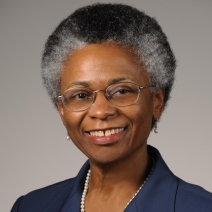 Marie A. Bernard, MD, deputy director of the National Institute on Aging, will give the 2018 Phillips-Winn Memorial Grand Rounds on Fri., Dec. 1. Her presentation title is "From Mice to Men: Highlights of National Institute on Aging."
Marie A. Bernard, MD, deputy director of the National Institute on Aging, will give the 2018 Phillips-Winn Memorial Grand Rounds on Fri., Dec. 1. Her presentation title is "From Mice to Men: Highlights of National Institute on Aging."
As the National Institute on Aging’s senior geriatrician, Dr. Bernard serves as the principal advisor to the NIA director, working closely with the director in overseeing approximately $2 billion in aging research conducted and supported annually by the Institute. She co-chairs two Department of Health and Human Services Healthy People 2020 objectives: 1) Older Adults and 2) Dementias, including Alzheimer’s Disease. Within NIH she co-chairs the Inclusion Governance Committee of the Extramural Activities Working Group, and co-chairs the Women of Color Committee of the trans-NIH Women in Biomedical Careers Working Group. Until October 2008 she was the endowed professor and founding chairman of the Donald W. Reynolds Department of Geriatric Medicine at the University of Oklahoma College of Medicine, and Associate Chief of Staff for Geriatrics and Extended Care at the Oklahoma City Veterans Affairs Medical Center.
Q: Please tell us about a priority or opportunity you will explore in your talk, “From Mice to Men: Highlights of National Institute on Aging."
A: NIA has a mission of funding research related to aging, ranging from the fundamental biological processes underlying aging, to clinical manifestations and population based studies. We are also the lead government funder of Alzheimer’s disease research. Thus, highlights of research in each of these realms will be shared - e.g., the new field of geroscience, that postulates that modifying aging can help forestall the development of chronic illness; findings related to caloric restriction and hormone modulation in human populations; morbidity and mortality trends at the population level and their implications for aging; and ongoing interventions to prevent or cure Alzheimer’s disease, with particular focus on broadening opportunities for researchers with a variety of research interests/expertise.
Q: Please tell us how your career took you to your current role as deputy director of the National Institute on Aging.
A: I am a geriatrician who started my interest in the field as the first certification and fellowship programs were being developed. I was privileged to have the opportunity to lead the development of the third Department of Geriatrics in the U.S., the Donald W. Reynolds Department of Geriatric Medicine at University of Oklahoma College of Medicine. There I taught medical students in a required geriatrics rotation that we developed, as well as residents, fellows, and practicing physicians. Much of what we taught was based on evidence supported by funding from NIA. After having served on the National Institute on Aging National Advisory Council, and leading the Department for a decade, I was made an offer I could not refuse – to join the NIA leadership to help steer future research in aging.
Q: The Phillips-Winn Memorial Lecture honors two Duke Department of Medicine faculty, George Phillips and Michelle Winn, who were role models, leaders and champions for diversity. Can you talk about the importance of diversity from your perspective at the National Institute on Aging?
A: NIA is very focused on diversity issues – both among the scientific workforce, and in research itself. In fact, we have an Office of Special Populations that leads an internal working group on diversity issues, and a subcommittee of our National Advisory Committee, the Task Force on Minority Aging Research (TFMAR). A few years ago, the TFMAR requested that we review our research portfolio on diversity. An outcome of recommendations from that review was the development of a framework for diversity research (Hill CV, Perez-Stable EJ, Anderson NA, Bernard MA: The National Institute on Aging health disparities research framework. Ethn Dis 2015;25(3):245-254), that will be a component of the 12/1/17 presentation.
The Phillips-Winn Memorial Grand Rounds is sponsored by the Department of Medicine.